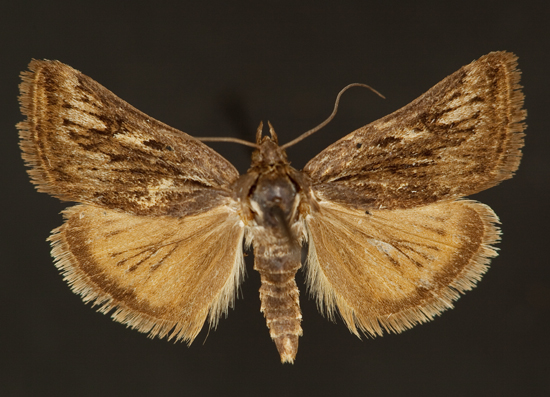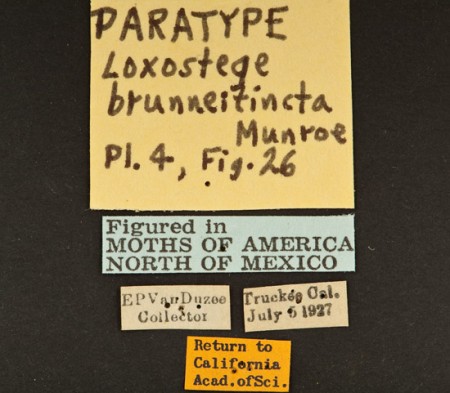Today’s moth is an understated brown Crambidae, Loxostege brunneitincta. While this isn’t a particularly captivating moth it does have an interesting story that illustrates the need for scientific collections and museum loans. If you read the label image you will notice the moth was originally collected in 1927 by E. P. Van Duzee in Truckee, CA. Van Duzee was a noted Hemipterist and a curator at the California Academy of Sciences for 24 years until his death in 1940. His collections of bugs (in the literal sense) alone totaled 164,442 specimens, and like many entomologists Van Duzee collected everything he came across and likely added another 100,000 specimens to the museum of groups he wasn’t even studying.
And so this little brown moth remained in the CAS until the 1970’s when Eugene Munroe borrowed specimens for his work on the genus Loxostege. The resulting 1976 fascicle described this species as new to science and even used this specimen as an illustration in the book. If you’re unfamiliar with the term paratype it’s a specimen from the series (excluding the holotype) that was used to describe that species. And while this particular moth doesn’t seem to be abundant, the genus does have some more notorious pests like the southern beet and alfalfa webworms. More often than not the pets themselves are well known but the genera they belong to might be enigmatic. But thanks in part to Van Duzee and many entomologists like him, Munroe was able to assemble a collection of specimens that would have taken decades (if not longer) to gather. And only with a sufficient collection is a comprehensive assessment of species possible.
Monday Moth3 comments to Monday Moth |
Skepticism |



Interesting. I especially like seeing the labels.
Just a few weeks ago I found the larva of a South American species in the genus, Loxostege bifidalis, and the feeding it does in soybean in Argentina. Might be a good time to put up those photos.
Indeed! I should start posting labels more often, I always photograph them along with the specimen. I have to say the oddest label I’ve ever come across was from a Salticidae. A friend was sorting them in ethanol and had to show me – after the locality it read “bit me on the penis”!
I bet that hurt !